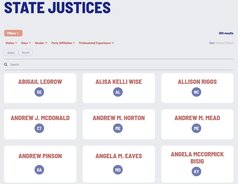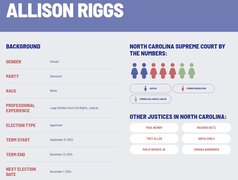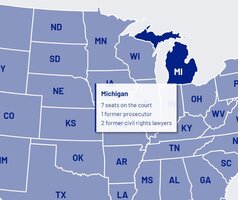
Every State Supreme Court Justice in One Searchable Database
A new resource from the State Law Research Initiative lets users sort the nation’s high court justices by state, professional background, party affiliation, and more.
As state courts assume a greater role in shaping legal rights across a range of issues — including abortion access, climate change, voting rights, equality for trans people, and the limits of criminal punishments — it’s crucial to know who is empowered to make these profoundly important rulings. Understanding how state supreme courts work and wield power means understanding who serves on them, not just on a state-by-state basis, but also through national trends and the ways in which state high courts differ from each other.
A new interactive resource from the State Law Research Initiative compiles information about state supreme court justices into a single searchable database, allowing users to sort all 350 state high court justices by a variety of factors — like state, professional experience, race, gender, and party affiliation. Every state and every individual justice has their own page.
Like the federal judiciary, state supreme courts have long-been dominated by former prosecutors and corporate lawyers, while public defenders and civil rights lawyers — particularly civil rights lawyers who have worked outside of government — are few and far between. This sort of disparity goes to the heart of judicial legitimacy. How can historically marginalized and politically powerless people — that is, those who depend most on fair and impartial courts — expect a fair hearing before judges who have spent their legal careers fighting to preserve the status quo of wealth and privilege?
Of course, other measures of diversity also matter. With a recent appointment, for example, the South Carolina Supreme Court is no longer the nation’s only all-male state supreme court, but it became the 19th high court without a single non-white member. In South Carolina, that means an all-white court will have the final say on state constitutional and other rights for a population that is one-third Black or Hispanic. And a Brennan Center report on judicial diversity in the states published last month found that 26 states have no women of color serving on their supreme courts.
To explore the database, start here with a sortable list of every justice in the country:

This list can be filtered to, for example, isolate every former prosecutor (there are 135 of them), corporate lawyer (132), or public defender (47). If you then view, say, the individual page for North Carolina Justice Allison Riggs, you see her background as a legal aid and civil rights lawyer, along with the professional experience data for the entire North Carolina Supreme Court, with links to the individual page for the other North Carolina justices:

An interactive map allows navigation to each state page, and professional diversity data is provided by hovering over each state:

As state supreme courts increasingly decide the scope of our fundamental rights, it has perhaps never been clearer that judicial selection matters. With this tool, advocates have access to data that can inform both state and national campaigns to expand judicial diversity. Journalists covering state supreme court rulings can add essential context about the judges who made them. And the general public can better understand how the strength of individual rights in many cases begins with the process of nominating, appointing, and electing state supreme court justices.
Kyle C. Barry is director of the State Law Research Initiative. Learn about the State Law Research Initiative and its legal advocacy to strengthen state constitutional rights against excessive punishments here.
Suggested Citation: Kyle C. Berry, Every State Supreme Court Justice in One Searchable Database, Sᴛᴀᴛᴇ Cᴏᴜʀᴛ Rᴇᴘᴏʀᴛ (June 7, 2024), https://statecourtreport.org/our-work/analysis-opinion/every-state-supreme-court-justice-one-searchable-database.



Related Commentary
The Next Wave of Legislative Assaults on State Courts
Utah’s rush to add seats to its supreme court signals a major escalation in legislative tactics to curb judicial independence.
A Conversation with Wisconsin Supreme Court Justice Rebecca Frank Dallet
Dallet discussed equal access to justice, challenges to the rule of law, and her commitment to getting the law right.
Who’s Hiring State Supreme Court Clerks?
State-by-state information to aid law students and young attorneys in securing a state clerkship.
A Conversation with North Carolina Justice Allison Riggs
Riggs discusses the drawbacks of partisan judicial elections, the decisions that have meant the most to her, and why she smiles at everyone who argues in her court.